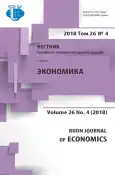Economic efficiency of the nuclear power industry and social aspects of its development
- Authors: Lukyanets A.S1,2, Nguyen C.T.3, Moiseeva E.M1
-
Affiliations:
- Institute of Socio-Political Research under the Russian Academy of Sciences
- Peoples’ Friendship University of Russia (RUDN University)
- Institute of European Studies under the Vietnamese Academy of Social Sciences
- Issue: Vol 26, No 4 (2018)
- Pages: 598-608
- Section: INDUSTRIAL ORGANIZATION MARKETS
- URL: https://journal-vniispk.ru/2313-2329/article/view/342964
- DOI: https://doi.org/10.22363/2313-2329-2018-26-4-598-608
- ID: 342964
Cite item
Full Text
Abstract
About the authors
Artem S Lukyanets
Institute of Socio-Political Research under the Russian Academy of Sciences; Peoples’ Friendship University of Russia (RUDN University)
Email: artem_ispr@mail.ru
Cand. Sci. (Econ.), Leading Researcher, the Institute of Socio-Political Research under the Russian Academy of Sciences (ISPR RAS); Associate Professor, the Department of International Economics, the Peoples’ Friendship University of Russia (RUND University). 6 Fotievoy St., bldg. 1, Moscow, 119333, Russian Federation; 6 Miklukho-Maklaya St., Moscow, 117198, Russian Federation
Canh Toan Nguyen
Institute of European Studies under the Vietnamese Academy of Social Sciences
Email: okabc007@yahoo.coml.ru
Dr. Sci (Econ), Professor, Researcher, the Institute of European Studies under the Vietnamese Academy of Social Sciences (VASS). 176 Thai Ha St, Dong Da Dist, Hanoi, Vietnam
Evgeniya M Moiseeva
Institute of Socio-Political Research under the Russian Academy of Sciences
Email: evgeniyamoiseeva@mail.ru
Researcher, the Institute of Socio-Political Research under the Russian Academy of Sciences (ISPR RAS). 6 Fotievoy St., bldg. 1, Moscow, 119333, Russian Federation
References
- Borzunova T.I., Maksimova A.S., Morozova G.F. (2017). The estimation of possible socio-economic consequences of nuclear power station building in Vietnam province Nin Thuan. RUDN Journal of Economics. Vol. 25 (3). Pp. 381-392. doi: 10.22363/2313-2329-2017-25-3-381-392 (In Russ.)
- Hirschberg S., Dones R., Heck T., Burgherr P., Schenler W., Bauer C. (2004). Sustainability of Electricity Supply Technologies under German Conditions: A Comparative Evaluation. PSI report. No. 04-15
- Lukyanets A.S., Ryazantsev S.V. (2016). Economic and socio-demographic effects of global climate change. International Journal of Economics and Financial Issues. Vol. 6. No. S8. 269 p
- Wald M. (6 November, 1980). Cost of Nuclear Power. The New York Times. Late City Final ed. B3
- Lukyanets A.S., Nguyen Canh Toan. (2016). Atomnaya energetika kak faktor ekonomicheskogo razvitiya i ekologicheskoy stabil’nosti. Nauchnoe obozrenie. Seriya 1: Ekonomika i parvo. No. 6. Pp. 57-66. (In Russ.)
Supplementary files









